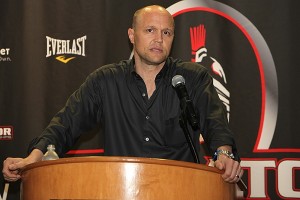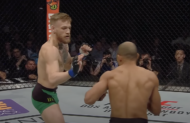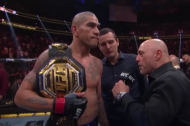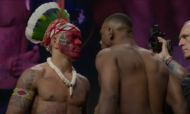Part II: Bellator CEO Bjorn Rebney Says More Fighters Headed To TNA Wrestling, Blasts WSOF Matchmaker For Promoting and Managing Fighters
By Joshua Molina
Bellator CEO Bjorn Rebney feels he is riding atop a wave of momentum as his company ventures into the Pay-Per-View business on Nov. 2 with a main event between former UFC superstars Tito Ortiz and Quinton “Rampage” Jackson.
Part of the buildup includes a partnership with fellow Spike TV property TNA wrestling, where Ortiz and Jackson are engaged in a pro wrestling-style feud. Ortiz recently hit Jackson with a hammer on TNA television. Although such theatrics might turn off the hardcore MMA fan base, Rebney told Full Contact Fighter that the working relationship between TNA and Bellator is great for business.
“MMA fans are really smart and they can differentiate professional wrestling from MMA,” Rebney said. “My job is to build the fan base. If I have an opportunity to put some of our superstars on TNA Impact and have 2 million people watch and became fans, that is a tremendous opportunity for me.”
Rebney said he enjoys the partnership with the TNA company executives.
“I am a huge huge fan of Dixie Carter’s,” said Rebney of the TNA President. “She is an absolute visionary. She is really setting the bar. I have been trying to figure out a way to work within the TNA dynamic.”
Rebney said there are “others to come,” from Bellator to TNA.
The biggest challenge from the partnership, Rebney said, was knowing hlow difficult it is to train for professional wrestling. “King Mo” Lawal, for example, plans to wrestle professionally and fight as a mixed martial artist. Lawal has already said that pro wrestling training is more rigorous than MMA training. Rebney is aware of the dangers.
“You say a prayer before you go to bed everynight,” Rebney said. “Professional wrestling is not an easy industry. I always get nervous about the guys.
What those guys do, there’s a lot of risk, but without the risk there’s no reward.”
Bellator also turned heads this year with the announcement of its reality show, “Fight Master,” which was similar to the UFC’s “The Ultimate Fighter” and featured coaches and trainers Randy Couture, Frank Shamrock, Greg Jackson and Joe Warren. The topsy-turvy ratings have forced some to question whether the show has been a success and whether Bellator might be spreading itself too thin by branching out into so many venues.
“I don’t know what the future plans will be for Fight Master,” Rebney said. “Our focus is on the live experience.”
Ratings have been as low as 398,000 viewers to as high as 676,000 viewers for one episode.
“My personality is that nothing is ever good enough,” Rebney said. “If the ratings were two or three times higher than what they were I would have wished they were higher.”
As his company attempts to capture a greater share of the marketplace, Rebney has become increasingly vocal in his opinions on different aspects of the MMA world.
Within the industry, many MMA insiders have voiced opposition to the practice of company matchmakers also managing MMA fighters. Bellator, for example has Sam Caplan and the UFC has Joe Silva. Both individuals are known for strong matchmaking abilities and neither manages fighters.
Upstart promotion World Series of Fighting (WSOF), on the other hand, has a matchmaker, Ali Abdel Aziz, who is also a partner in Dominance MMA Management, which manages fighters, some of whom like Gregor and Rolles Gracie and David Branch, are on the World Series of Fighting roster. Kickboxing company Glory also has a similar situation with fighter relations staff managing certain fighters on the roster.
Abdel Aziz has defended his position on the record, stating that he has pulled back from steering the careers of fighters on the Dominance MMA Management roster but, by the same token, admits that he is still a partner in the company.
The practice of both managing and promoting fighters – effectively placing yourself on both sides of the negotiating table – is illegal in the sport of boxing because of The Muhammad Ali act. Rebney is outraged by the practice.
“Anytime you have a matchmaker or a promotion executive managing fighters, you have an enormous conflict of interest,” Rebney said. “You really have a casting agent who is casting for a movie. It is wrong. It should not happen. One of the key emphases in the Muhammad Ali act was to eliminate that exact type of conflict. The conflict of interest is blatant.”
Looking ahead, Rebney said he is excited about Bellator’s voyage into Pay-Per-View and the future of the company.
“The news coverage of what is going on with this Pay-Per-View eclipses any other news out there,” he said.
Bellator will continue to take an aggressive business approach, he said, and focus on the athletes and sport of MMA.
“The tournament model is what makes us different,” Rebney said. “Ours is all objective and ours is all tournament-based, that objecitivity that we have in real sports. That is exactly what makes us who we are.”
For Part 1 of the interview with Bellator CEO Bjorn Rebney, click here
Follow reporter Joshua Molina on Twitter @JECMolina










